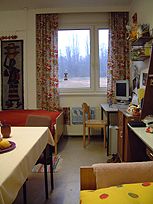12.19 Student accommodation
 Halls of residence (der Studentenwohnheim) Halls of residence (der Studentenwohnheim)
All students in Germany soon become familiar with one piece of vocabulary - "die Wohnungsnot" or "the shortage of accommodation". For the absence of suitable student accommodation in German university towns and cities is becoming more acute each year. Places in halls of residence are strictly limited and in some places waiting lists of several semesters mean that new students (der Studienanfänger) have little or no chance of getting a room in them on their arrival. In the summer of 2002 there were only 9,700 rooms available in Munich's halls of residence for the city's 65,000 students. Of the 14,000 new students arriving for the winter term, only 700 would receive a place in a Studentenwohnheim and the waiting list was as long as four university semesters (das Semester).
The problem is particularly difficult for students with children, as student residences offer only a restricted number of places for families. On the whole they offer single and double rooms with several students sharing a kitchen and possibly bathroom facilities, too. Other universities also offer short-term accommodation in university guest-houses, but this is hardly a long-term solution to the problem.
In the past few years universities such as Dresden have even had to resort to placing mattresses in gyms and setting up "cities of tents" (die Zeltstadt) to accommodate students in the first few weeks of a new term (normally in September and February). In Munich, authorities were forced to set up Big Brother-style living containers (der Wohncontainer) and even so-called living cubes (der Wohnwürfel) to house students, with women sleeping on top and men at the bottom!
The private accommodation market (der private Wohnungsmarkt)
Looking for accommodation on the private accommodation market is much harder is some locations than in others. Accommodation is particularly scarce in large cities in what used to be West Germany, with Munich, Stuttgart and Hamburg being severe accommodation black spots. Yet in smaller university towns (die Universitätsstadt) with large student populations such as Marburg, Göttingen and Würzburg, lack of rooms mean that students may be forced to live as far away as thirty of forty kilometres from the university itself. This is particularly true in Tübingen in Baden-Württemberg where 25,000 of the town's population of 85,000 are students. As a consequence rents are soaring, with unscrupulous landlords charging up to 250 euros a month for unfurnished and often ramshackle rooms and one-room flats (die Einzimmerwohnung).
At first glance the situation may appear less drastic in the former GDR. Students in Erfurt and Leipzig have a better chance of getting a room in a hall of residence than many students in Western Germany. Yet in other cities university accommodation is strictly limited, with halls of residence is urgent need of renovation (die Sanierung). Private rooms in old buildings (der Altbau) are relatively cheap but there are not many private landlords in Eastern Germany. In Berlin, Potsdam, Leipzig, Dresden, and Magdeburg blocks of apartments have now been built but they are not subject to rent control and are severely over-priced.
 |
| An East German Altbau |
|
Student administration organisations have noted that foreign students are at a particular disadvantage. Not only is Germany a comparatively expensive place to stay for many overseas students, but they can receive prejudicial treatment from landlords on racial grounds. And so whilst Germany is investing millions of euros in promoting an international exchange programmes for students, many students are forced to cancel their exchange and leave Germany without having found a room.
Finding solutions
In 2001, the Deutsches Studentenwerk (DSW), the organisation for German student affairs, demanded the creation of an additional 21,000 rooms in student halls of residence across the country - but to little effect. Protest measures including setting up student living containers in front of key public buildings (see picture) may have highlighted the students' plight, but concrete improvements are thin on the ground.
 Local student organisations have come up with imaginative campaigns to mobilise the local population. In Freiburg, the project "Wohnen für Hilfe" (= accommodation for help) has been launched aims to encourage senior citizens to offer rooms to students in (partial) exchange for help and support. In Heidelberg, another university city in the south-west of Germany, posters have been printed bearing the legend "Student sucht Zimmer" (= student looking for a room) and depicting a student desperately clutching a house (see graphic left). Students were allowed to paste over general election posters in Heidelberg once voting had been concluded in September 2002 and the campaign logo also appears on postcards and beer mats. Local student organisations have come up with imaginative campaigns to mobilise the local population. In Freiburg, the project "Wohnen für Hilfe" (= accommodation for help) has been launched aims to encourage senior citizens to offer rooms to students in (partial) exchange for help and support. In Heidelberg, another university city in the south-west of Germany, posters have been printed bearing the legend "Student sucht Zimmer" (= student looking for a room) and depicting a student desperately clutching a house (see graphic left). Students were allowed to paste over general election posters in Heidelberg once voting had been concluded in September 2002 and the campaign logo also appears on postcards and beer mats.
Accommodation agencies for students
At a number of further education institutions, student services have produced brochures with useful advice for students who are "auf der Wohnungssuche" (= looking for somewhere to stay). Some of these services have also founded student accommodation agencies. Here you will be required to put down a financial deposit and then be given three contact addresses offering accommodation. The deposit will be returned when the student returns to the agency the next day to report on the progress that has been made.
 Quite a few private accommodation agencies (die Mitwohnzentrale) have also sprung up in recent years. For a commission which can be quite high, they will put you in contact with individuals or companies offering accommodation. These private agencies may prove your last resort in areas where houses, flats and rooms are particularly scarce. Quite a few private accommodation agencies (die Mitwohnzentrale) have also sprung up in recent years. For a commission which can be quite high, they will put you in contact with individuals or companies offering accommodation. These private agencies may prove your last resort in areas where houses, flats and rooms are particularly scarce.
There are a number of organisations that can assist overeas students in the search for "eine Bleibe" (= somewhere to stay). Most universities will have a Foreign Student Office that can inform overseas students about vacancies in student accommodation and advise on application procedures. Some Foreign Student Offices are able to put you in contact with private landlords if students have passed on the name and address at the end of their research period.
 |
| A student housing protest |
|
In addition the Deutsches Studentenwerk (DSW) has put together a service package for overseas students to ensure that students from abroad are able to manage the essential items of their cost of living during their stay at economical prices. It also aims to help them come to terms and find their way around their host country.
Advice for accommodation-seekers
Should you wish to study at a German university yourself and need to find accommodation, don't despair but do allow yourself plenty of time and plan in advance! Contact the aforementioned organisations well in advance and if you do need to travel to the place itself to find somwhere to stay, time your visit wisely.
A good time is at the end of the semester (i.e. in February and July) when those who have completed their studies leave town. This might mean that you might have to pay rent a couple of months in advance, but you run the risk otherwise that the accommodation market will become ever more saturated the closer it gets to the start of the following term.
As we have seen in this chapter, advertisements on student notice boards (das schwarze Brett) are a common way of finding somewhere to stay. Many university web-sites also have online notice boards for accommodation, such as this one hosted by the University of Leipzig. Local newspapers and listings magazines also carry useful adverts. You might also wish to try the following websites for further information:
 |
Web Links |
 |
| Web sites on student accommodation |
 |
DSW |
The Deutsches Studentenwerk (DSW), the central German organisation for student affairs can offer advice on searching for student accommodation and supply contact details for your local branch of the organisation. |
 |
DSW Info for International Students |
The Deutsches Studentenwerk (DSW) offers advice for overseas students to help them settle down in Germany and this includes aid in finding accommodation. |
 |
Studenten-WG |
The Studenten-Wg.de website offers you the opportunity to post and find accommodation advertisements in more than seventy German university cities. |
 |
Unicafe.de |
Check out the student accommodation advertisements on the Unicafe.de website. In German only. |
 |
Wohnpool |
The Wohnpool website allows you to check availability in halls of residence and peruse other accommodation adverts. |
 |
WG-gesucht |
If you're looking for a room in a German WG, then WG-gesucht is a good place to start. In German only. |
 |
Housing ads |
Check out the student accommodation advertisements on the Studenten-Wohnung.de website. In German only. |
|
 Chapter 12.20: How to read accommodation advertisements Chapter 12.20: How to read accommodation advertisements

 Print This Page Print This Page
|